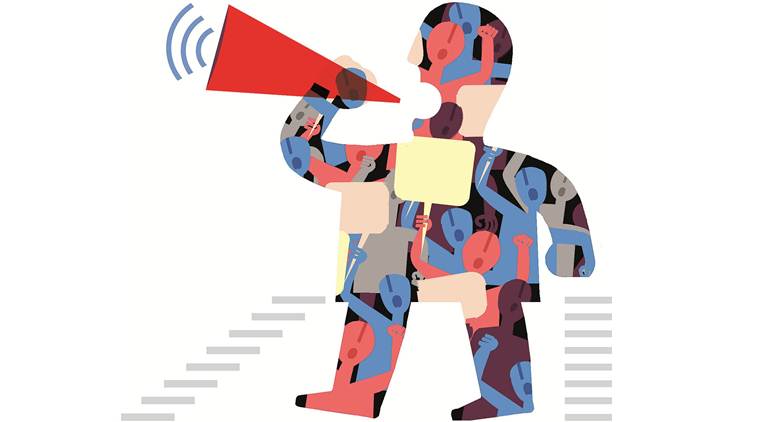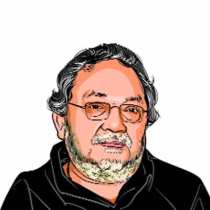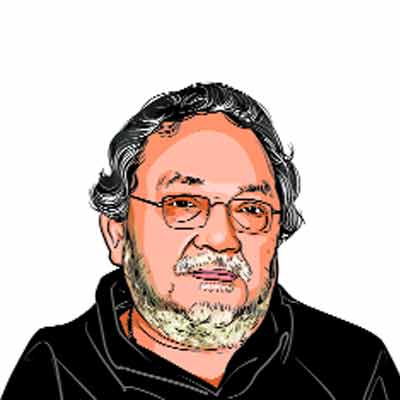The soundtrack of democracy
Supreme Court order on Jantar Mantar frames an often-ignored reality: Protest is a part of polity and the inconvenience it causes an affirmation of our common humanity.

Thanks to the Supreme Court, we may now look forward to this “khalal”, this necessary, if unwelcome, addition to the soundtrack of our lives. (Illustration: CR Sasikumar)
There is a peculiarly poignant moment right at the end of Nabokov’s Lolita when his devilish, devilishly-articulate protagonist is sitting on a mountain slope above a village. Children are playing in the village below, and it is “the melody of children at play” that wafts up to him as he awaits the agents of the law, toiling up the slope to arrest him. At this improbable moment, Nabokov grants him a moment of redemption: “I stood listening to that musical vibration from my lofty slope … and then I knew that the hopelessly poignant thing was not Lolita’s absence from my side, but the absence of her voice from that concord.” Ever so briefly, without skipping a beat even, he realises the horror of the fact that more than her virginity, he has stolen her childhood from her.
We have become connoisseurs of poignancy in the last some years. That “some” is deliberately ambiguous. I don’t wish to get embroiled in the competitive whataboutery that has become our dominant form of argument: Your atrocity is bigger than mine. In this puzzling game, the net sum of the atrocities that are pitched against one another is not two atrocities but — magic — no atrocity at all. So 1984 cancels 2002 — they don’t add up, and compound, as they would in a civilised society. Nellie cancels Bhagalpur cancels Muzaffarnagar cancels… it is a long list. When violence goes beyond a certain level, it is no longer even a violation. It becomes the norm.
But as connoisseurs of poignancy, we cannot help noticing the unprecedented sights — and sounds — that are nightly on offer. The saffron-swathed CM of UP, Mr Bisht, assured us that the live-streamed video of a murderous assault on a prostrate citizen by a murderous mob armed with iron rods and even a sledgehammer is no big deal — til ka taad, he called it, in folk idiom. But we mere ordinary people can’t help noticing the addition to the soundtrack of our lives of the sound of flesh being pulped by metal, of bones being broken, of desperate entreaty, of human beings exulting in the inflicting of gratuitous and extreme cruelty. Think Akhlaq, Pehlu, Junaid, Rakbar — it is a long list.
A further feature is the sheer brazenness of these nightly spectacles. The killers themselves make a record of the violence, and broadcast it in the expectation of approbation. Expectations duly fulfilled, by the way, by no less than the Harvard-educated Jayant Sinha (Just “business school”, Amartya Sen demurred, but still, a rare literate in a generally semi-literate dispensation). However, what is crucial in the Nabokov example is what is missing from the “concord of children’s voices” or, in our case, the massed “discord” of breaking bodies, of howling mobs and, not to be missed, the pompous voices stiff with hypocrisy about law and justice for all — for the living and the dead, the killers and the killed.
Now the Supreme Court has passed an extremely significant order, restoring the right of protest at Jantar Mantar and at India Gate. It is unlikely that any protest here will be featured in the corporate media, and there is a potentially crippling disability in making the expression of protest subject to the discretion of the police. But even so, this is an important step in restoring the sound of democracy to the prevailing “discord”. It is no great mystery that the powerful are embarrassed by the possibilities of democratic expression — bar none, BJP, Congress, CPM, TMC, and any other alphabets you can add to the soup. But, thankfully, the Supreme Court recognised that this “embarrassment” is an essential part of the democratic process.
Of course, it is inconvenient. When Mahendra Singh Tikait’s farmers bring the Capital to a standstill — the original cause of the restricting order — or when the farmers of Marathwada march to the Assembly in Mumbai to represent their distress to their representatives, it is entirely true that ordinary citizens going about their daily business are adversely impacted. This is not only unavoidable, I would argue further that this “inconvenience” is necessary.
We are all inescapably — inextricably, ineluctably — a part of one another. Subcontinent though we be, we are, adapting Donne, part of one continent, parts of one whole. Coexistence is our destiny. Given our cultural investment in the image of the joint family, we are prone to get misty-eyed about it. But the actual experience of living with different people, we know, inevitably involves tiffs and grumbles, quarrels and compromises. And the quest to find ways of living together — Bollywood myths apart — must be unending. But real tragedy happens only when relationships break down, and the family fragments. Meanwhile, both at the domestic and the national level, politics must remain, inverting Clausewitz, the preferred form of war.
This is a difficult insight to cling on to in a caste society, where caste boundaries seem to define the limits of humanity. How else can one explain the banquet of atrocity that is on offer daily? And where, indeed, a deceitful myth of “the nation” is sought to be deployed in order to gloss over this fact and to camouflage the self-interest of the dominant castes. The Hindu savarna castes — Brahmin, Thakur, Bania — cannot afford to speak in their own name, and therefore mask their claim in a notion of the nation which, effectively, brands all those who do not serve that caste-interest to be “anti-national”. In such a poisonous social and political context, consenting — more accurately, being forced by judicial fiat to consent — to being “inconvenienced” by each other’s clamour for recognition and relief might be, ironically and perhaps even paradoxically, an affirmation of our common humanity and our shared democracy. But perhaps even consent is not necessary — the “inconvenience” is proof enough. In the words of the familiar Begum Akhtar ghazal — “Itna to zindagi mein kisi ki khalal pare.” Thanks to the Supreme Court, we may now look forward to this “khalal”, this necessary, if unwelcome, addition to the soundtrack of our lives.
The writer taught in the Department of English, Delhi University
For all the latest Opinion News, download Indian Express App
More From Alok Rai
- Blame the hatGeneral Bipin Rawat has been far too eloquent on matters he ought to be quiet about. He did sound silly while elaborating on ways to…
- All About My MotherlandThe evolution of our country's identity from the unifying mother of yore to the strict father of contemporary nationalist times...
- Orwell, againBut Trump’s America is a latecomer. It has much to learn from Vishwaguru India...








































No hay comentarios:
Publicar un comentario